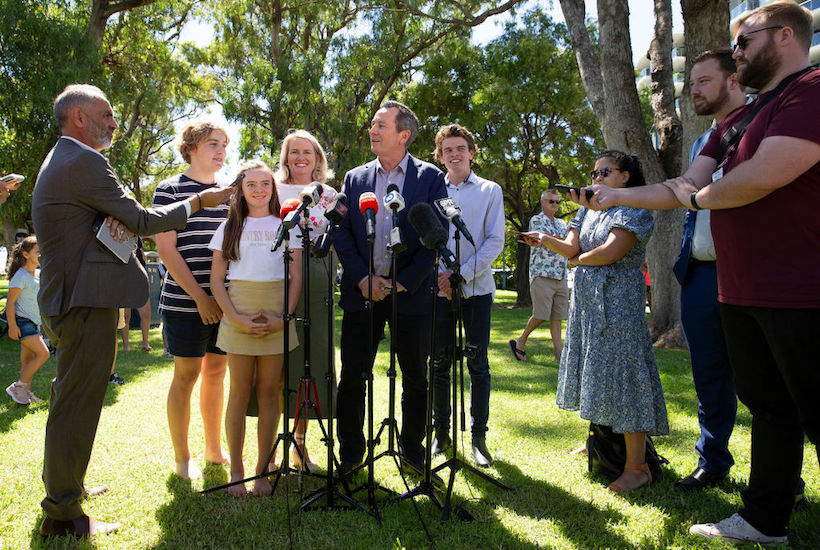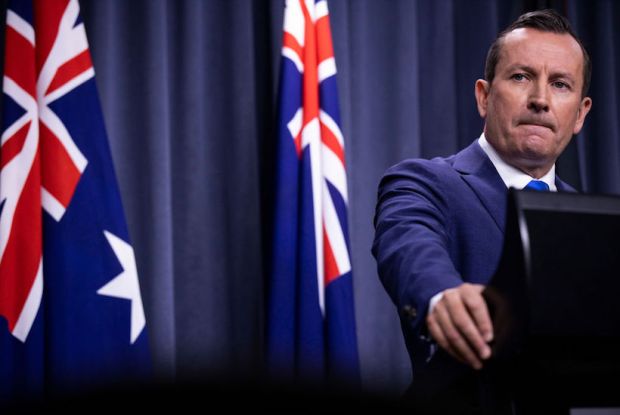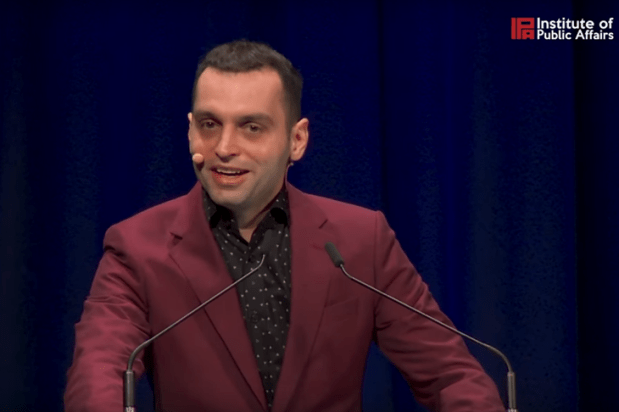Sometime towards the end of 2008, former Prime Minister John Howard came to Perth to give a speech on human rights at the University of Western Australia. Until shortly before his visit, every state, territory, and the Federation had been ruled, for a few months, only by Labor governments. However, by the time Howard came to Perth, the Liberal Party had been elected in Western Australia; it was the only non-Labor government in Australia at that time. John Howard, in his introduction, jovially observed that it is “good to inhale liberal air for a change” (or words to that effect).
Only thirteen years later, the Liberal Party has been obliterated in this weekend’s WA election. The size of the victory of the McGowan Labor government is staggering. The victory is, at least to some extent, the result of the failure of the Liberal opposition to highlight weaknesses in the policies of the Government and to energetically develop alternative proposals for the State. This failure has now led to the disintegration of the conservative forces in WA, and it heralds the beginning of a long road back to the government benches.
On election night, I watched the ABC coverage of the election. Antony Green, the ABC’s election guru, was able to call the election at 6.44 pm, barely a little more than half-an-hour after the election booths had closed. A former Liberal Leader, Dr Mike Nahan was representing the opposition on the ABC Panel that provided commentary on the election. Any neutral, astute observer who cared to reflect on the comments made by the panel members, would have concluded that Nahan was representing the ALP because he spoke in glowing terms about Mark McGowan and his government, indicating the Premier had done a very good job managing the Covid-19 pandemic while also releasing surplus budgets. He also confidently stated that the Liberal Party could learn from the Premier and the Labor Party.
It could be argued reasonably that the panel members exhibited a serious lack of understanding of the reasons for the wipe-out of the Liberal opposition. During the discussion, the panel members identified the Western Australian border closures and the lockdown of Perth during the first week of February 2021 as important reasons for the spectacular Labor victory. Apparently, these decisions were wildly popular and, in effect, elevated the Premier to the realm of god-like creatures with a nearly 90% satisfaction rating. The closing of the border and the lockdown were leitmotifs in the panel’s discussion throughout the evening and became a popular refrain.
In November of last year, the then opposition leader, Liza Harvey, had called for the opening of the border. However, she was relentlessly criticised, even to the extent that she could not continue to serve in her role. The leadership of the party was handed to Zac Kirkup, an inexperienced 34-year-old politician who had not even spent one term in the parliament and has now lost his own seat. He unwisely conceded defeat several weeks before the election was to be held. Why would electors vote for a party that had already decided it had lost the election?
The border closures and lockdowns dramatically raised the profile and satisfaction rating of the Premier to obscene heights. It is nevertheless necessary to review the appropriateness of these measures because the most popular responses to the Covid-19 challenge are not always the best. Are border closures good for the State? What are the consequences of border closures and lockdowns for the tourism industry?
A High Court challenge was initiated by Clive Palmer against the WA border closure. While the Federal Government initially indicated its support for this action, it eventually withdrew its participation, acceding to incessant demands of the WA Premier. This challenge has since decisively been rejected by the High Court of Australia in a controversial decision involving an interpretation of s 92 of the Commonwealth Constitution. Professor Augusto Zimmermann has recently noted in an opinion piece published in Quadrant Online earlier this month that, “Section 92 is written in relatively simple language to describe a basic concept that any trade, commerce and intercourse among the States shall be “absolutely free”. In his article, Zimmermann argues that “This is certainly not vague but the Western Australian government has chosen to violate the constitutional provision and the High Court has failed in its duty to uphold the Australian Constitution.”
It is not the purpose of this piece to review all the lockdowns and border closures that were instituted by state and territory governments. It suffices to refer to the widespread use in Australia of these measures. For example, the government of Victoria ordered a third lockdown for five days which started at midnight on 12 February 2021. Queensland had previously also ordered a lockdown in the Greater Brisbane region on Friday, 8 January. These lockdowns came soon after the Covid-19 clusters disrupted life in the Northern Beaches area of Sydney and other parts of New South Wales. Lockdowns and border closures were presumably ordered to mitigate the dangers posed by the UK variant of the virus, which is apparently virulent and capable of spreading fast.
The resurgence of the Covid-19 virus in Sydney, Brisbane, Melbourne, and Perth certainly reminds Australians of the fragility of our responses to the virus. In Australia state governments initially ordered lockdowns as a method ‘to flatten the curve’ and are now used as the preferred method to prevent the spread of the virus.
In embracing lockdowns and border closures, governments and their medical advisers are guided by the remarkable success of the Chinese lockdown of Wuhan. Thus far, China only has a total of 90,044 cases and 4,636 deaths have been recorded. This surely is an impressive statistic considering the geographical size and population density of China. The Australian lockdowns are similarly successful, even if the cost is extraordinarily high, devastating our economy, disrupting the way Australians live, and thrashing the civil rights of people in the process. While some Western countries will recover sooner than others, the energy and resources pumped into overcoming the spread of the disease have undeniably given the Chinese an unexpected chance to achieve its geopolitical objectives, including the takeover of Hong Kong by adopting a security law and a new election law which have practically wiped out any personal rights that people usually associate with liberal democracy. There is little doubt that China’s tit-for-tat trade war with Australia and the United States is an unfortunate by-product of the lockdown strategy since it robbed the West of the energy and willingness to meaningfully respond to the challenges created by China’s search for world hegemony. Also, and perhaps more worryingly, is the long-term impact of intermittent lockdowns and border closures on the exercise of civil rights, especially in Australia where many people seem to acquiesce in the erosion of their rights. Spontaneous demonstrations against lockdowns only occur sporadically and are unlike those we have seen in the United Kingdom, Germany, and the United States.
I have always been struck by the overwhelming popular support for lockdowns and border closures, at least as temporary measures, to fight the spread of the virus. Western Australia is merely the latest example of this support which was exploited by the Labor during the election. This support has also translated into an electoral victory in Queensland of the Palaszczuk government. These electoral victories embolden the government of these states to take drastic steps as soon as a real or potential problem is encountered.
While not disputing the usefulness of lockdowns and border closures as a strategy to fight the spread of the disease, I am concerned that this strategy may have effectively deprived Australia of a willingness to rationally search for alternative, and ultimately more humane and less intrusive, strategies to deal with Covid-19. The proponents of lockdowns and border closures are certainly able to point to a decreasing number of Covid-19 cases and fatalities by maintaining lockdowns until there is a discernible drop in the rate of infections. In contrast, opponents of lockdowns usually refer to the disastrous economic dislocations that may result from implementing the lockdown strategy. In this context, a study by the United Nations estimated that an additional 130 million people worldwide will starve this year resulting from the economic damage wrought by lockdowns. However, while admitting the huge economic cost of lockdowns, representatives of Australian governments and health officers argue, apparently persuasively, that without health, there simply is no economy. Of course, governments are aware of the economic devastation wrought by lockdowns and border closures. To mitigate the effects of this strategy, governments have found billions of dollars to compensate industries and to keep employees in business during the pandemic. In this context, the Western Australian Government has announced a plan to increase tourism offerings. The plan, costing $217 million would also include a grant of $50 million to build an Aboriginal cultural centre. Although it is easy to print money, surely the economic ramifications of this support will eventually increase inflation and result in more unemployment.
While it would be easy to highlight the economic ramifications of lockdowns and border closures, any opposition to lockdowns should rationally focus on their effect on the health of people. Martin Kulldorff, professor of medicine at Harvard University, Sunetra Gupta, professor at Oxford University, and Jay Bhattacharya, professor of medicine at Stanford University have highlighted “the damaging physical and mental health impacts of the prevailing COVID-19 policies.” These professors, who are noted epidemiologists, have issued the Great Barrington Declaration, arguing that “lockdown policies are producing devastating effects on short and long-term public health.” Their research points to “lower childhood vaccination rates, worsening cardiovascular disease outcomes, fewer cancer screenings and deteriorating mental health – leading to greater excess mortality in years to come, with the working class and younger members of society carrying the heaviest burden.” The Declaration recommends the adoption of an approach called “Focused Protection”, which involves allowing “those who are at minimal risk of death to live their lives normally to build up immunity to the virus through natural infection, while better protecting those who are at highest risk.” The importance of the epidemiologists’ recommendation lies in its ability to secure a long-term solution to the Covid-19 pandemic, whereas lockdowns and border closures are merely reactive short-term temporary measures that seek to limit the spread of the virus. They are, however, measures that happen with monotonous regularity in Australia.
It is regrettable that the current focus on lockdowns and border closures may have blinded the authorities into believing that this strategy offers the best approach capable of controlling this disease and that, therefore, it is not necessary to seriously consider alternative strategies. The lockdowns and border closures have prevented a rational discussion on the impact of the disease on various classes of people, especially young Australians, while disregarding the special needs of vulnerable citizens, older people, disabled people, and people in care facilities. Of course, any responses to the Covid-19 challenge are fraught with serious problems. The inability or unwillingness to rationally consider all appropriate responses and strategies to fight the spread of the disease may well be one of the casualties of the strategy. Perhaps the time has come to reconsider our response to the continuing health threats presented by the virus and to consider alternatives to lockdowns and border closures?
In this regard, the success of the Labor Party in the Western Australian election will not help; it is likely to exacerbate the problem by relying on measures which, while successful in the short term, carry the germs of ultimate defeat when people become tired and frustrated by the intermittent, repeated, and erratic border closures and lockdowns.
Gabriël A Moens AM is an Emeritus Professor of Law at the University of Queensland, and author of a novel, A Twisted Choice, on the origins of the Covid-19 pandemic.
Got something to add? Join the discussion and comment below.
Get 10 issues for just $10
Subscribe to The Spectator Australia today for the next 10 magazine issues, plus full online access, for just $10.


























Comments
Don't miss out
Join the conversation with other Spectator Australia readers. Subscribe to leave a comment.
SUBSCRIBEAlready a subscriber? Log in